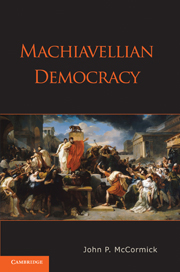Introduction: Liberty, Inequality, and Popular Government
Published online by Cambridge University Press: 05 June 2012
Summary
The desires of free peoples are rarely pernicious to freedom.
Machiavelli, Discourses I.4The few always behave in the mode of the few.
Machiavelli, Discourses I.7The political impact of economic inequality is an increasingly vexing problem in contemporary democracies, especially the United States. The expectation that government will be accessible and responsive to all citizens on a relatively equal basis is an enduring hallmark of popular government. Yet democratic theorists and policy analysts today seem incapable of answering a question that was central to the life of pre–eighteenth-century republics: what institutions will prevent wealthy citizens from dominating a government that is supposed to serve the entire citizenry? Before modern democracy, the motivations and resources of the wealthy were considered among the chief threats – often, the greatest domestic threat – to the stability and liberty of popular governments. Unless formally restrained, the richest citizens tended to use their power and privilege to molest the vulnerable with impunity and manipulate the workings of government for their own benefit rather than that of the general citizenry. In pursuit of these ends, wealthy individuals and families frequently subverted republican governments, maneuvering them in more narrowly oligarchic or autocratic directions, even, on occasion, going so far as to deliver them to foreign powers.
On the contrary, the constitutional framers of modern republics conceptualize control of elites in politically narrow and sociologically anonymous terms: they concentrate almost exclusively on the power and influence that public officials, not wealthy citizens, might wield inappropriately.
- Type
- Chapter
- Information
- Machiavellian Democracy , pp. 1 - 18Publisher: Cambridge University PressPrint publication year: 2011

